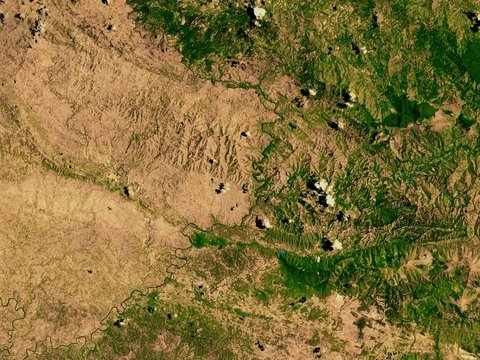Economic Growth Is Not a Ponzi Scheme

There's all too much popular misconception that economic growth is "unsustainable" akin to a Ponzi scheme. This may be true for some types of growth, but certainly not from the natural type induced by free exchange. It's important to understand the differences in growth and to make sure our language doesn't confuse issues.
In "Economic Shrink" Don Boudreaux explains that " the material prosperity widely enjoyed today is not being paid for by unsustainable extractions and uses of resources today." What he means is that real growth entails value creation, not a shuffling, or even cannibalization, of resources.
Economic growth of the sort that much of humanity has enjoyed over the past 250 or so years is no Ponzi scheme. The very real gains enjoyed by billions of people over these past few centuries are not the fruits of prepaid sacrifices by even larger numbers of people.
Economics is so often described with silly allegory, whether it's of the economy likened to a mechanical engine with simple levers to pull for better outcomes, or as a fixed pie in which one person's prosperity necessitates another's suffering. This is all nonsense...dangerous nonsense that justifies bad policy.
"The economy" is a dangerous term in itself. What we mean is the interaction of billions of human beings, their wants, needs, preferences, and how they choose to exchange value with one another; this is an extremely complex system, to say the least, and poorly modeled with math equations.
As human beings create value, we say that "the economy" is growing. There's nothing static about this, and so the proverbial pie can grow constructively without the ancient customs of exploitation that unfortunately still cloud understanding of basic economics.
Deviations From Reality Are Unsustainable
What are unsustainable are deviations from reality. Whether it's an individual living beyond his means until he goes bankrupt, or a government trying to peg its currency to an exchange rate that few traders accept, trying to force reality to your will rarely works for long.
Unsustainable "growth" would be something along the lines of a government artificially boosting GDP by borrowing heavily and spending today; we know that at some point funds need to be repaid, or that capital destroyed in default.
Governments often trade future growth for the present illusion of prosperity, but this is just another deviation from reality that makes it unsustainable. This is not real value creating growth when the transfer amount is greater than would be freely invested without the policy.
Another example of potentially unsustainable growth is if resources are cannibalized for today's prosperity, entirely discounting future needs. This is often what those in the political "left" decry as a natural output of "unfettered Capitalism" or free markets.
As with many popular ideas, this is a bad misconception that requires prices to deviate from reality long enough to cause irreparable harm; this is the sort of thing only possible by governments forcing prices to ignore reality. For any resource to be critically depleted, the natural counterbalance of supply and demand mechanics needs to be disabled.
Prices naturally rise with increase in demand or decrease in supply, which tempers depletion. At any point in history where we've seen critical resource depletion, it has always been accompanied by dumb policy that disabled market mechanisms. This can come through price controls or inhibition of property rights, like forest depletion in Haiti versus the Dominican Republic--the former lacking property rights, the latter having better rights...despite being on the same island, Haiti's forests disappeared.
Economic "growth" due to resource depletion caused by disabling market mechanisms or inhibiting property rights is, in fact, unsustainable, but this is clearly not the cause of "unfettered Capitalism" or free markets; it's the opposite.
Understanding Reality
The science of economics should be about understanding the reality of quadrillions of interactions between billions people instead of writing prescriptions for what we think that reality ought to be. There is no better reflection of reality than to simply observe how people choose to interact with one another in marketplaces.
Serious problems come whenever power is wielded to force people to deviate from reality. What looks like growth that comes from such deviations is more likely than not to be unsustainable. Growth from value creation in marketplaces is fully sustainable, and the distinction between the two needs to be better understood or else we're doomed to more bad policies.
What are your thoughts?
If you like this post, please upvote, resteem, or share below! Please check out my other articles and follow @finpunk to keep in touch with future content.
Rob Viglione is a PhD Candidate in Finance @UofSC with research interests in cryptofinance, asset pricing, and innovation. He is a former physicist, mercenary mathematician, and military officer with experience in satellite radar, space launch vehicles, and combat support intelligence. Currently a Principal at Key Force Consulting, LLC, a start-up consulting group in North Carolina, and Head of U.S. & Canada Ambassadors @BlockPay, Rob holds an MBA in Finance & Marketing and the PMP certification. He is a passionate libertarian who advocates peace, freedom, and respect for individual life.
Image source: https://en.wikipedia.org/wiki/Deforestation_in_Haiti
but but but...welfare payments generate a million dollars for every dollar spent, TRUE leftist stability /sarc
lol oh yeah, and forcing wages higher can never decrease demand for labor :)
I feel smarter after just reading your Bio Lol :)